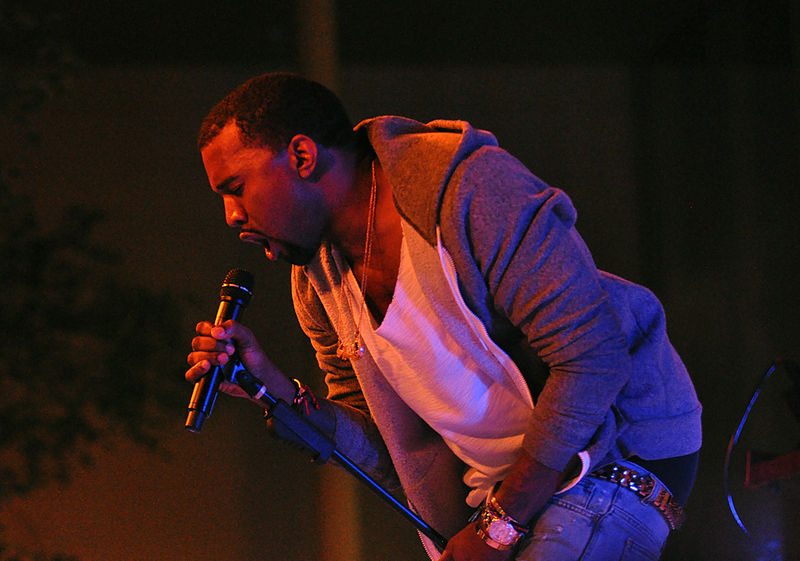You’d be excused for forgetting, but up until a few years ago Kanye West was quite popular in mainstream American culture, as both a person and an artist. His albums regularly received rave reviews (he even ended up near the top of Best of the Decade lists ten years ago.) His shenanigans, though perhaps not always condoned, could be (and often were) excused and explained as the expression of a unique and unpredictable artist, always at the ready to maximally unleash his unreserved id upon the world, whether that meant rapping about a modern succubus while using a sample of the anti-lynching dirge “Strange Fruit,” or storming an awards show stage to take a stand for artistic integrity.
But now, things are different. People call him “crazy,” and his albums receive mixed reviews. What changed? What turned the cultural and critical consensus away from Kanye? Did he suffer a precipitous artistic decline? Or is something else afoot?
Perhaps it’s entirely coincidental, but I can’t help but notice that this sudden skepticism of Kanye happened to fall right around the time he was very publicly supporting Donald Trump. Doing so not only spurred many high-profile celebrities to unfollow Kanye on Twitter (the horror!) but prompted a sizable segment of the pundit class to, in so many ways, ask the question, “What on earth is Kanye thinking?” Answers ranged from the aforementioned “he’s crazy” to “it’ll be a ratings boon for his wife’s TV show.” Similar confusion met Kanye’s recent embrace of Christianity. While Mr. West himself represents his conversion as a life-altering paradigm shift, others remain skeptical, even going so far as to suggest that it may merely represent a very involved stunt.
In the same vein, questions dog Emma Sulkowicz, aka “Mattress Girl.” She’s the young lady you may have heard about who, at the beginning of the decade, carried a dorm-room mattress around Columbia University to represent the burden campus sexual-assault survivors carry with them while their attackers are allowed to remain on the grounds. It’s worth noting that Ms. Sulkowicz’ performance art was not a mere abstraction: she herself reported being sexually attacked by another student, and felt less than adequately supported by the university’s and the city’s response to her allegations. In the intervening years Sulkowicz continued staging outre performances before renouncing art, and raising eyebrows by making some right-of-center friends.
Like Kanye, there are those who question Ms. Sulkowicz’ motives, even some of those libertarians she’s recently befriended. They wonder if they’re being set up to look silly later. Some of this side-eye from the public– both from those thrilled to see two recognizable names joining the ranks of “their side,” and from those conversely spurned– is entirely understandable. The performance artist, for better or worse, tends to work at an ironic remove from their audience, and has thereby garnered a reputation as someone whose work mocks or condemns a gullible society. Those mocked and condemned don’t want to look foolish, and are therefore often on guard against being “played.” Therefore the public’s wary skepticism is often understandable — it’s the same instinct that causes people to whisper upcoming plot twists of movies to their friends.
But it’s not always justified. People use it not to maintain a remove from the artist’s work, but to dismiss the artists themselves. Sometimes even people with abrasive public personas — like Kanye West and Emma Sulkowicz — are genuine about their political changes of heart, and we would all be better off if we took them at their word, instead of looking for reasons to disbelieve them. The “where did it all go wrong?” think-pieces, the publicly-announced Twitter un-followings, and all the rest of the tut-tutting emanating from the entertainment world in the aftermath of these celebrities questioning mainstream orthodoxy, shed light on an aspect of polarization that those of us not glamorous enough to be profiled by glossy magazines and national newspapers grapple with semi-regularly.
This is, after all, the time of year when extended families gather ‘round the dinner table and have to figure out a way to deal with relatives who—gasp—disagree with them. A regular sub-plot of that yearly play is the family member who shocks everybody with their relatively recent conversion: “I always liked Aunt Sally so much, and I know she voted for Obama twice, but now she’s lost her mind and told me that she’s gonna vote for Trump!”
Lost her mind. People tend to ascribe various motives to these sudden changes of heart in their relatives, and just as often, in the celebrities they feel a certain attachment to even without knowing them personally. It’s a stunt, or they’re trolling us, or they’re not in their right minds, or they’ve fallen under the sway of a wayward spouse, or they’re seeking to remain relevant, or they’re rich and brainwashed now after joining the ranks of the global elite, or, or, or…
Denial and rationalization of a person’s change of heart lets us off the hook. If someone we admire or are close to has just “gone crazy,” or fallen victim to whatever other motive we can attach to them, then we ourselves don’t have to do the hard work of actually trying to understand or think through their conversion, or have empathy for their current mindset. We don’t have to understand what they’re trying to say, either in their public sentiments or through their chosen artistic method.
It’s all so easily dismissible—they are simply poor unfortunate souls who lost their way. If we did the hard work of trying to understand where Kanye or Emma or Aunt Sally was coming from, why they might be dissatisfied with their old paradigm, and why a new framework for approaching the world might be attractive to them, then we might actually have to come to grips with the fact that modes of thinking different than our own have merit. Instead, it is so much easier and more convenient to bury our heads in the sand and stay inside our self-selected polarized bubbles, and tell ourselves that anyone who thinks differently than we do must have lost some rational agency due to factors at least partially outside of their control.
These sentiments are especially troubling when they apply to artists like Kanye and Ms. Sulkowicz. We want artists to follow their muses, to create splendid, euphoric works after having deeply absorbed the chaos of the world and channeled the universal pain and beauty of what it means to be alive through their chosen mode of expression. We like to think of artists as tortured souls, who experience existence with such piquant feeling that they’re always on the razor’s edge of inspired genius and outright depravity. Then we celebrate their messy, inspired, even genius creations, and marvel at their ability to bequeath us that something, springing from their own specific proclivities that yet illustrate thematic underpinnings universal to the human soul….
So long as they agree with us.
When an artist is tortured or erratic, but produces work amenable to our worldview, we tend to give them the benefit of the doubt and celebrate their eccentricities. But as soon as their work seems heretical or dangerous or wrong, we see them as burdened, mentally weak grifters who gave in to the heavy, soul-destroying weight of their chosen profession. A switch in mindset or politics is like Van Gogh chopping off his ear: evidence of a disturbed temperament that has lost all connection with the real, rational world.
This isn’t the way to think about it. Let artists be artists. Someone like Kanye West or Emma Sulkowicz or Bob Dylan (in all of his different outward and musical manifestations) is supposed to be curious about and open to the world they’re in. Artists are supposed to follow their muses all the way down the line, no matter where they might lead. If we like what they have to say, we’ll often celebrate them for being ahead of their time, or having unique insight to the current moment. But if we don’t like what they’re saying, we condemn them for doing that which is intrinsic to inspired artistry, just because it happens to lead them to a framing of the world that we find alien or discomfiting. Any great artist worth his or her salt would hope to provoke such feelings, because challenging people, and forcing them to confront different modes of operating within the world, is part and parcel of an artist’s job.
Therefore we ought to give artists, and others who have the courage to try on and possibly adopt new paradigms, the benefit of the doubt. We need to give people the opportunity to explore all the world’s complexity, up to and including different political stances, and allow them to express the frame of mind in which they’re currently operating. Finally, we should be open to the idea that, yes, though they might change their mind about issues dear to us, they deserve to be earnestly respected and honestly judged, their output or point of view appreciated for what it is, not for what we wish it to be.




